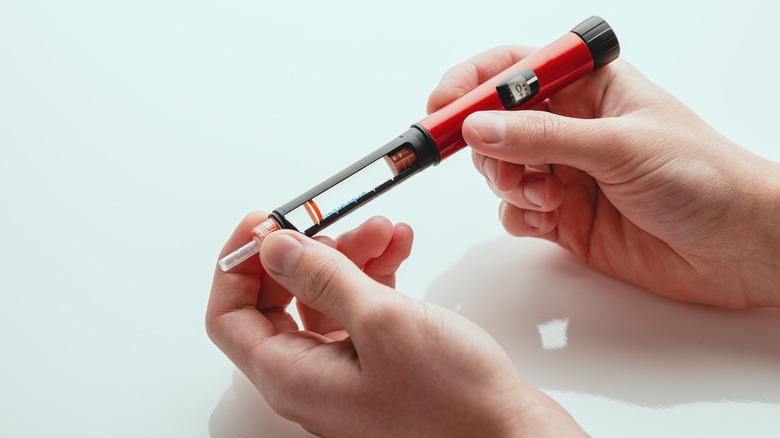The Effect Diabetes Has On Your Body
Diabetes is a very common disease worldwide. According to the World Health Organization, approximately 422 million people globally have the disease. Types 1 and 2 are the most common forms of diabetes. Approximately 1.9 million people in the United States have type 1 diabetes, according to the American Diabetes Association. The Centers for Disease Control and Prevention (CDC) notes that type 1 is caused by an autoimmune reaction that destroys the beta cells in your pancreas. This stops your body from producing insulin.
The CDC also notes that type 2 diabetes is more common, affecting about 90-95% of diabetes cases. This type is triggered by the body's inability to use insulin efficiently to manage blood sugar levels. Causes often include unhealthy lifestyle choices and other underlying conditions that include age, ethnicity, race, and family history, per Mayo Clinic. In addition to a variation in treatment options, these two main diabetes types can have serious repercussions on the body if left untreated.
How diabetes affects the body
There are many ways diabetes can affect the body. Meritus Health notes that especially with type 2 diabetes, some symptoms may remain invisible for several years, earning diabetes the popular "silent killer" moniker. According to WebMD, diabetes affects your heart and circulation. The source indicates that diabetic damage to the body begins with high glucose and insulin levels. If the condition goes untreated, various organs are affected. Over time, the body breaks down, making it susceptible to serious heart, kidney, and other conditions, including eye problems, nerve damage, and skin issues.
Medical News Today further reiterates that high glucose and insulin levels caused by diabetes decrease the elasticity of blood vessels, making the vessels narrower and ultimately threatening blood flow. The result is a reduction in blood and oxygen supply, elevating the risk of high blood pressure, which explains why nearly 74% of adults with diabetes have hypertension.
Other common diabetes symptoms include frequent thirst, sudden weight loss, blurred vision, and frequent urination. According to Mayo Clinic, these symptoms happen because the kidneys get overworked in their attempts to absorb the excess glucose produced and filter it out. If the kidneys exceed their limits, any extra amount of glucose produced will be excreted into your urine, dragging along other fluids from the tissues, which can also cause dehydration — hence the common complaint of thirst.
Diagnosis and treatment
It's crucial to talk to your doctor if you notice symptoms that might be associated with diabetes. According to Cleveland Clinic, you can take various blood tests to check your glucose levels. One such is the fasting plasma glucose test. This is typically done in the morning after an 8-hour fast. Another is the random plasma glucose test, which is taken at any time without fasting. According to the CDC, an A1C test, also known as the hemoglobin A1C test, is another test commonly used to diagnose both diabetes and prediabetes. The A1C test measures your average blood sugar levels over the past three months.
In regards to treatment, medication and various lifestyle changes are usually prescribed based on the type of diabetes. The National Institute of Diabetes and Digestive and Kidney Diseases (NIDDK) notes that taking insulin several times daily will help those with type 1 diabetes to better manage blood glucose levels. In contrast, those with type 2 and gestational diabetes might achieve balanced glucose levels by modifying their lifestyle and meal choices, though medication is also an option for some.



